稠厚物料灌装机构设计
无需注册登录,支付后按照提示操作即可获取该资料.
稠厚物料灌装机构设计(含任务书,开题报告,外文翻译,毕业论文说明书20000字,进度检查表,CAD图纸7张)
摘 要
液料物料(简称液料)灌入包装容器的装置叫做灌装机或灌装设备。液料依自重即能灌入包装容器如油、酒、果汁、牛奶、酱油、墨水、糖浆、农药等;也有的需要借助外界压力才能灌入包装容器,如番茄酱、肉糜、牙膏、香脂等。对于低粘度液料,根据是否溶解有二氧化碳气体而分为含气和不含气两类。对于含气液料,习惯上将不含酒精成分的,如汽水,可口可乐、矿泉水等,称为软饮料,而将含有酒精成分的分为如啤酒,汽酒、香槟酒等称为硬饮料。液料包装容器主要有玻璃瓶、金属灌,以及用塑料或柔性复合材料制成的各种杯、管、瓶、袋等。在我国目前仍广泛采用玻璃瓶装各类液料。这是因为,玻璃原料资源丰富、成本低、化学稳定性好、贮存期长,无毒、易清洗,可回收使用,尤其适合包装高档商品。而其主要缺点则是较重、破碎率高、搬运不便。因此,今后宜大力发展轻量瓶及液料软包装。采用铝质二片罐和铝质瓶虽能较好地克服玻璃瓶所在的缺点,但是它制造工艺复杂,成本高,在国内暂时难以迅速推广。至于塑料容器,如聚氯乙烯瓶,因含有毒性的氯乙烯单体,不宜用作食品包装容器,而聚乙烯或聚丙烯容器因其阻气性较差,也不宜灌装含气的和易氧化液料。现今,正致力于研制新型包装材料,如聚酯瓶、共挤复合瓶、复合包装盒等。
采用机械化的灌装方法不仅可以提高劳动生产率,减少产品损失,保证包装质量而且还可减少生产环境和被灌装液料的相互污染。
关键字: 灌装;番茄;机械化
Abstract
Liquid material (or liquid) device into containers called filling machine and filling equipment. The liquid material according to the weight can be poured into containers such as oil, wine, fruit juice, milk, soy sauce, ink, syrup, pesticide; others need the help of outside pressure can be poured into containers, such as tomato sauce, minced meat, toothpaste, balsam. For low viscosity liquid material, according to whether the dissolved carbon dioxide gas into gas and free gas two. With the gas liquid, habits, non-alcoholic ingredients, such as Coca Cola, soft drinks, mineral water, known as soft drinks, and alcohol component is divided into such as beer, champagne, sparkling wine, called hard drinks. Liquid packaging container glass bottles, metal irrigation, and a variety of cup, made of plastic or flexible composite tubes, bottles, bags etc.. In China is still widely used in glass bottles of various liquid materials. This is because, glass raw materials rich in resources, low cost, good chemical stability, long storage period, non-toxic, easy to clean, recyclable use, especially suitable for luxury goods packaging. But its main drawback is heavy, high crushing rate, inconvenient transportation. Therefore, in the future to develop light weight and liquid soft package. The use of aluminium two cans and aluminum bottle can effectively overcome the shortcomings of glass bottles, but its complicated manufacturing process, high cost, the temporarily difficult to spread quickly. As for the plastic containers, such as bottles for PVC, vinyl chloride monomer containing toxic, should not be used for food packaging containers, and polyethylene or polypropylene containers for its gas resistance is poor, not filling gas and easy oxidation liquid. Today, is committed to the development of new packaging materials, such as polyester bottle, bottle, co-extrusion composite packaging box.
The filling mechanical method not only can improve labor productivity, reduce product loss, ensure mutual pollution packing quality but also reduce the production environment and is filling the liquid material.
Keywords: tomato; paste ;machine
稠厚物料灌装机构用于软质稠厚物料(如肉糜等)的压力定力灌装。物料由供料泵通过管道送来,经稳压装置恒压控制后通过管道送来,经稳压装置恒压控制后通过灌装旋塞的定量和通道变换,由充填阀灌入包装容器。灌装量可通过活塞行程装置调整。
灌装精度:+—-0.30%
灌装速度:100灌/分
灌装量:0-500克
液体物料灌入包装容器内的装置称为灌装机或灌装设备。
液料以自身的粘度的不同,有的借助自重既能灌入包装容器,如油、酒、果汁、牛奶、酱油、墨水、糖浆、农药等,也有的需要借助外界压力才能灌入包装容器,如番茄酱,肉糜,牙膏,香脂等等。对于低粘度液料,根据是否溶解有二氧化碳气体分为含气和不含气两类。对于含气液料习惯上将不含酒精成分的,如汽水,矿产水、可口可乐等,称为饮料而将含有酒精成分的,如啤酒、汽酒、香槟酒等,称为硬饮料。
液体包装容器主要有玻璃瓶、金属灌,以及用塑料或柔性复合材料制成的各种环、管、瓶、袋等。我国目前仍广泛应用玻璃灌装各类液料。这是因为,玻璃原料资源丰富,成本低,化学稳定性好,储藏期长,无毒、易清洗,可回收使用,尤其适合储藏高档商品。而主要缺点就是则较重破碎率高,搬运不便。因此,今后宜大力发展轻量瓶及液料软包装。采用铝制二片灌和铝制瓶虽能较好的克服玻璃所存在的缺点,但是它制造工艺复杂,成本高,在国内暂时还难以迅速推广。
采用机械化灌装的方法不仅可以提高生产效率,减少产品损失,保证包装质量,而且还可减少生产环境与被灌装液料的相互污染。
它整体上有活塞行程调节装置,定量灌装阀、充填阀。
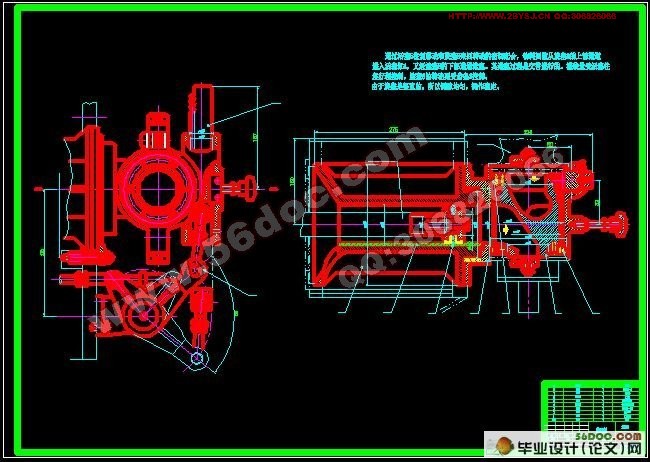
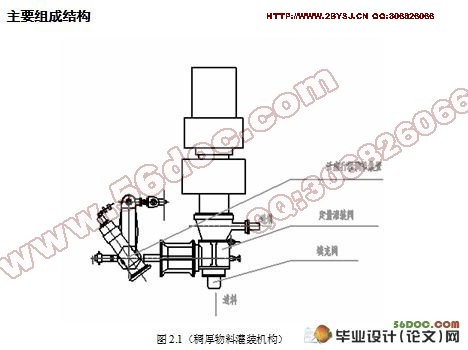
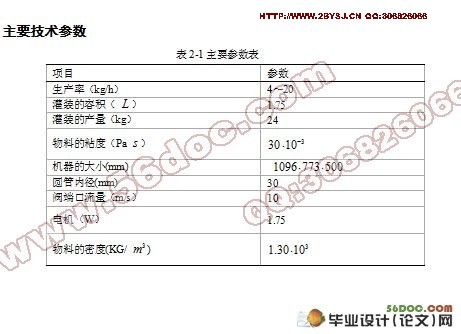
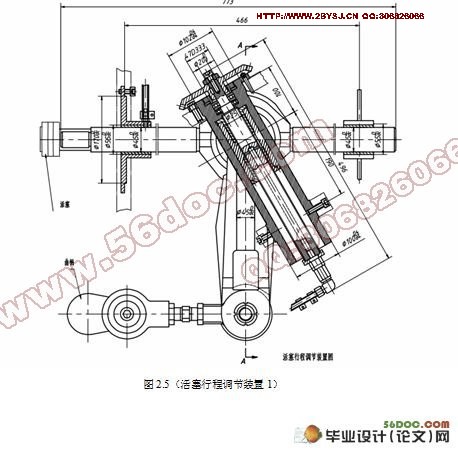
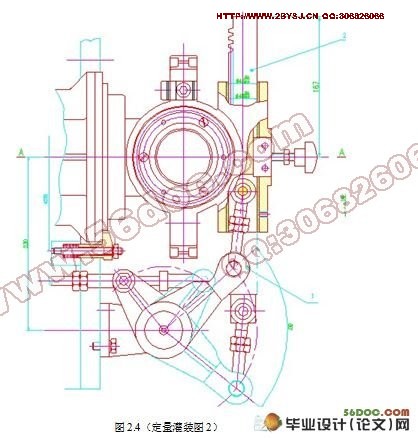
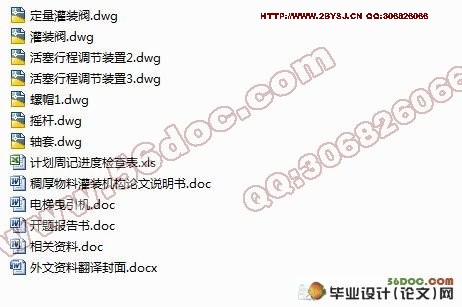
目 录
摘 要 III
Abstract IV
目 录 V
1 绪论 1
1.1本课题研究的内容和意义 1
1.2国内外的发展概况 2
1.3本课题应达到的要求 3
2 总体方案设计 4
2.1 主要组成结构 4
2.2 主要技术参数 5
2.3 工作原理与工作过程概述 5
2.3.1 稠厚物料灌装机的工作原理 5
2.3.2 稠厚物料灌装机的主要工作过程 8
3 灌装和基本参数计算 11
3.1 灌装 11
3.2 灌装机的总体结构 11
3.1.1 灌装方法 11
3.1.2 定量方法 13
3.1.3 灌装机基本参数计算 13
3.1.4阀端孔口流量计算 16
4 关键零部件 18
4.1阀门的启闭形式 18
4.2 活塞行程调节装置 22
5、灌装机密封、清洗、润滑 24
5.1灌装机的密封 24
5.2关键零部件的密封 24
5.3灌装机的清洗 24
5.4 灌装机的润滑 25
6 结论与展望 27
6.1 结论 27
6.2 不足之处及未来展望 27
致谢 29
参考文献 30
附录 31
